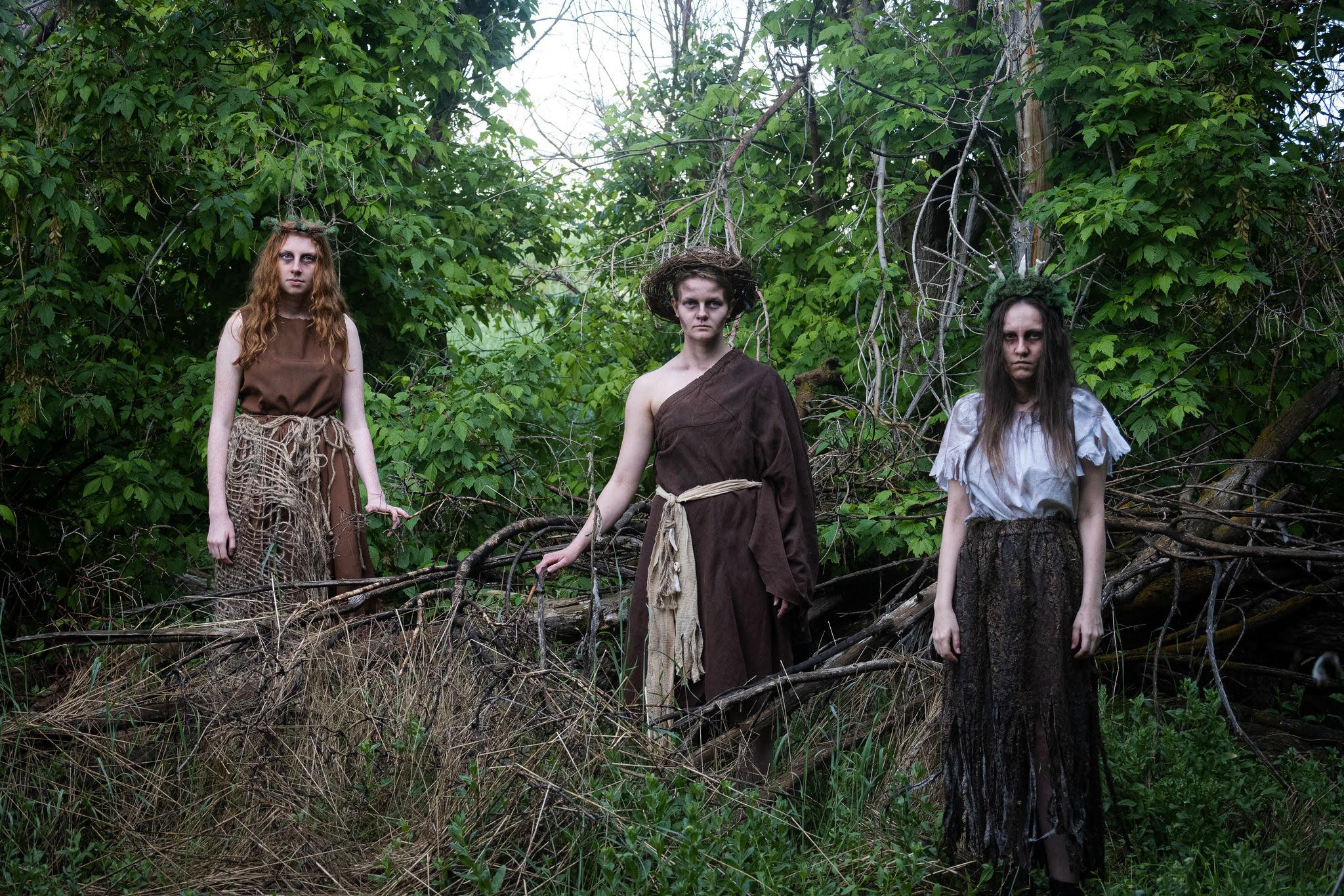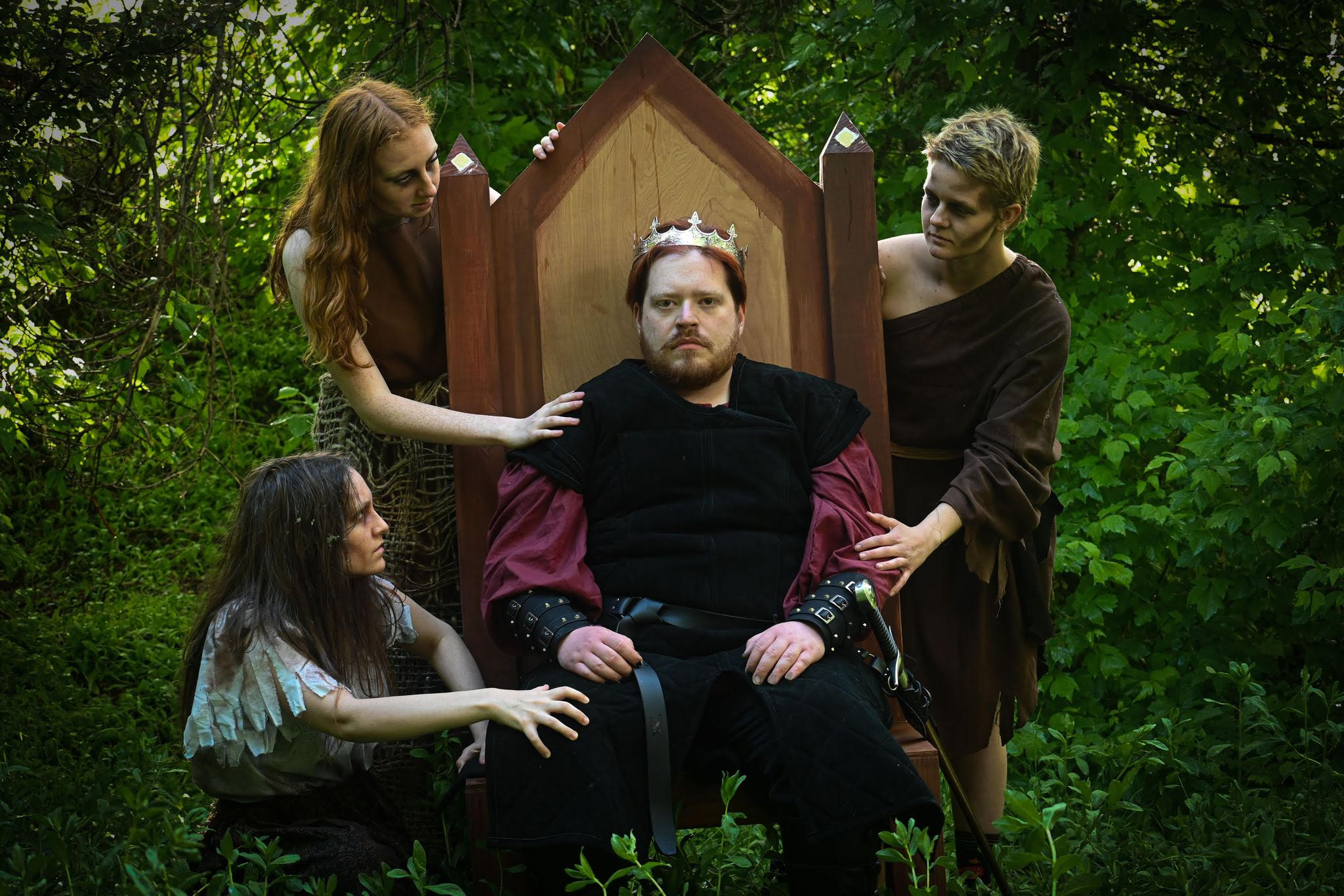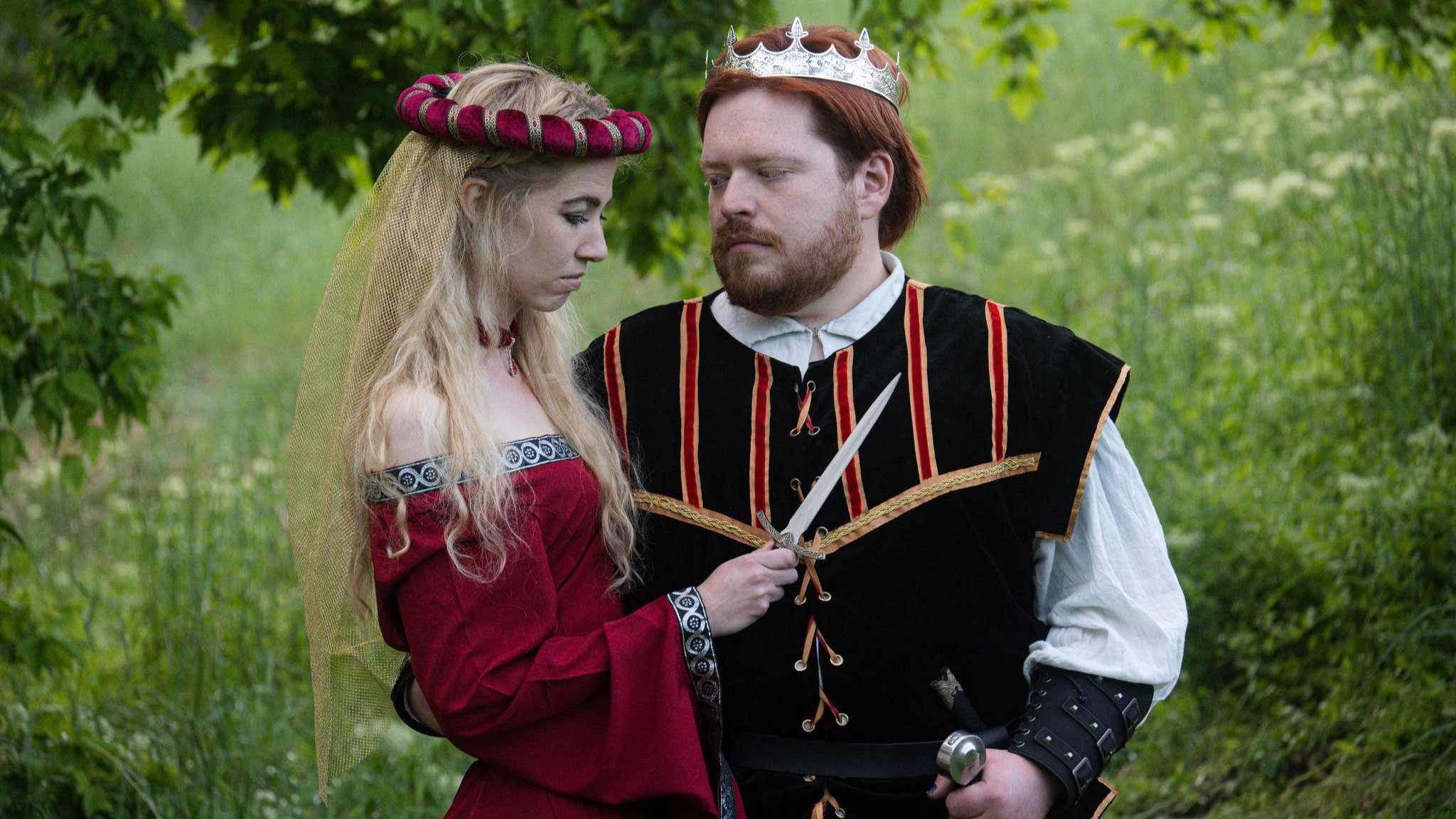TOOELE — Nestled in a small outdoor amphitheater with a natural wooded background as storm clouds loomed overhead, a child (played by Lauryn Ray) plays on the ground with a wooden wolf and sheep. A young women with a wild appearance and a gaunt face enters startling the child. The child runs and encounters another creepy woman. The child turns and meet a third eerie figure before fleeing as the women begin to chant. Thus begins the opening night of Tooele Valley Theatre’s outdoor production of Shakespeare‘s Macbeth, directed by Chad Henwood.

As Macbeth (played by PJ Stinson) and Banquo (played by Megan Bishop) encounter the witches (played by Boston Bean, Boston Partridge, and Emilie Shinn) they hear the fateful prophecy that Macbeth will become the thane of Cawdor and then the King. The witches bow upon the ground as the hail Macbeth, thunder booming with each individual bow adding power to their actions (sound design by Tristan Bowman and Chad Henwood).
Small moments of individual reactions make Shakespeare’s language more understandable. When Ross (played by Julianne Fergusen) and Angus (played by Owen Parshley) come to deliver the news to Macbeth that he is now the thane of Cawdor, Macbeth rewards Ross for the message. Fergusen gives an unexpected smile of delight and surprise to Angus. When Macbeth hears that Malcolm (played by Blake Warner) is to be the Prince of Cumberland, envy, anger, and disgust all quickly flit across Stinson’s face, leaving me to wonder if I had actually seen the crack in Macbeth’s public façadee, only to later be assured during Macbeth’s aside that I had indeed witnessed those sinister emotions. I love these small moments because they keep the audience engaged, when they might otherwise become lost in language.
There are moments, however, when certain repetitive acting choices can become a distraction. For example, Stinson had a repeated eye and head roll motion. The look served well for showing that Macbeth was becoming unhinged, but high frequency diluted its effectiveness. The same could be said for the smiles from Lady Macbeth (played by Zel McAllister) in the beginning; she seemed far too pleasant to be plotting murder. I would have liked to see a little more contrast between her private demeanor and her public face. When that contrast did show up, as she talked of unlatching a baby and dashing its brains out it was startling and abrasive; I finally believed that she might be capable of murder. Until that moment her line about Macbeth, “Yet do I fear thy nature; It is too full o’ the milk of human kindness,” described Lady Macbeth better than Macbeth.

The “Is this a dagger which I see before me?” scene transitioned weirdly, as Stinson abruptly switched from speaking to the servant to hallucinating a dagger. Another odd choice occurred when the witches were creating their bubbling concoction. They used a realistic looking toad, but then all of the other names ingredients were represented by twigs and leaves. Even a few more realistic items would have helped me believe that these witches were more than crazy women pretending to make a potion.
Shakespeare was brilliant to include a scene of humor in his tragedies, and Ada Lauren Taylor as the Porter managed to lighted the mood considerably. Her way of saying, “Knock, knock,” reminded me of the delight in one’s own silliness, much like a child first learning to tell a knock-knock joke. I would happily watch Taylor perform that scene many more times.
The actor who truly pulled me into the show was Steven Argyle as Macduff. Often performers in amateur productions overemphasize the sing-song rhythm of their lines. Yet, Argyle spoke so naturally that I forgot I was listening to Shakespeare. If all performers could deliver their lines with the inflections and pauses as Argyle used, fewer people would be intimidated by Shakespeare. The scene where McDuff learns the fate of his family (Cassidy Ellensburger as Lady McDuff and Lauryn Ray as McDuff’s son, whom I had loved seeing in their earlier scene), was so moving it brought tears to my eyes. As Malcolm tells him to, “dispute it like a man.” Macduff responds with strength and heartbreak, “I shall do so, but I must also feel it as a man.” At that moment Macduff had my loyalty and support for the remainder of the play. That feeling solidified by the contrast of when Macbeth learns of the death of his wife; I loathed Macbeth entirely.

The costumes design by Breanna Lyman was classy, and I especially enjoyed that the witches felt medieval; they appeared to be women that superstitious folk would fear. Their costumes gave them the perfect amount of creepiness, while not being overly stereotypical. The set design by Collin Ray was simple enough to function as multiple locations in Macbeth’s world, while also being reminiscent of a town square where a traveling troupe would perform in Shakespeare’s day. While I wanted more detail and texture in the wooden slates of the fort walls, I loved that the simplicity of the painting left room for me to fill things in with my imagination.
The Tooele Valley Theatre production of Macbeth was worth getting rained on in the beginning. Normally, I have a somewhat negative attitude towards Shakespeare productions, and I do not generally seek them out. But two seasons ago, Tooele Valley Theatre taught me that I can enjoy Shakespeare as I watched their production of A Midsummer Night Dream. Tonight, Tooele Valley Theatre taught me that I can be moved to tears by a Shakespeare production. Sure, there were still moments I struggled to understand what was going on, but there were moments I felt myself grow as a theatre patron. And that is what elevates this Macbeth to a good production.
[box]The Tooele Valley Theatre production of Macbeth plays Thursdays through Saturdays through June 24 at the Tooele City Wigwam (4 Canyon Road, Tooele). Tickets are $12. For more information, visit tooelevalleytheatre.org.[/box]
